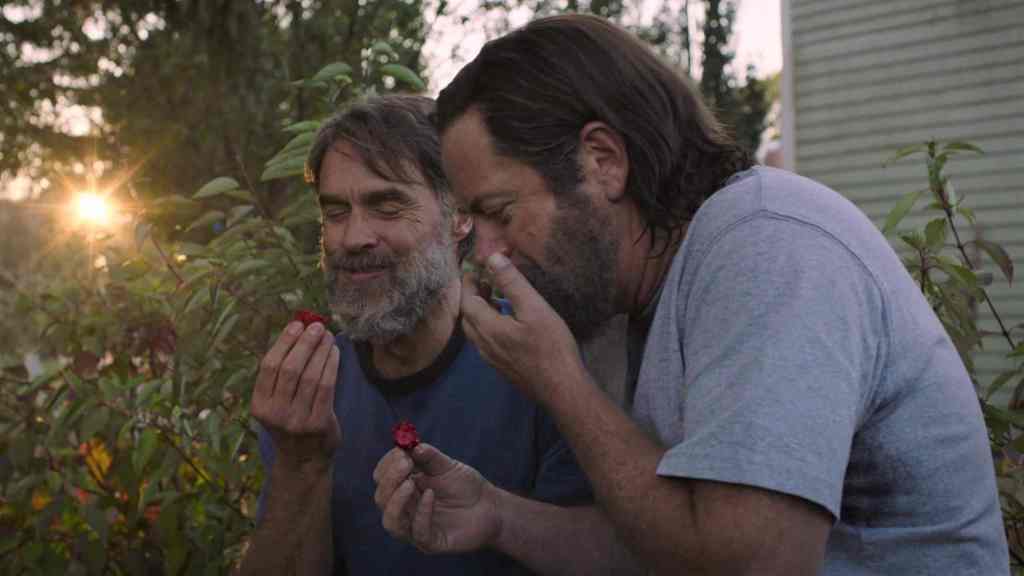Episode 3 of The Last of Us HBO was the strongest point of difference from its original source material to air so far, painting the story of two of two characters from the first game, Bill and Frank, in a more heartfelt and emotional light, as well as focusing on the budding relationship dynamics between the series two main protagonists, Joel and Ellie.
In this recap of HBO’s The Last of Us Podcast Episode 3, we’ll recount a few of the core themes and pieces of behind the scenes trivia as discussed by Showrunners Craig Mazin (Chernobyl), Neil Druckmann (Creative Director on The Last of Us Part I & II), and host Troy Baker (Joel’s original voice and motion capture actor on The Last of Us Part I & II), as well as break down the main deviations from the original games that this episode highlighted.
HBO’s The Last of Us Podcast – Episode 3 Recap – ‘Long, Long Time’
- A vulnerable Joel and Ellie
- Casting Nick Offerman
- Choosing ‘Long Long Time’ by Linda Ronstadt
- Major changes from The Last of Us video game
- Love and end of life
- The final window shot
- Additional analysis and notable quotes
A vulnerable Joel and Ellie
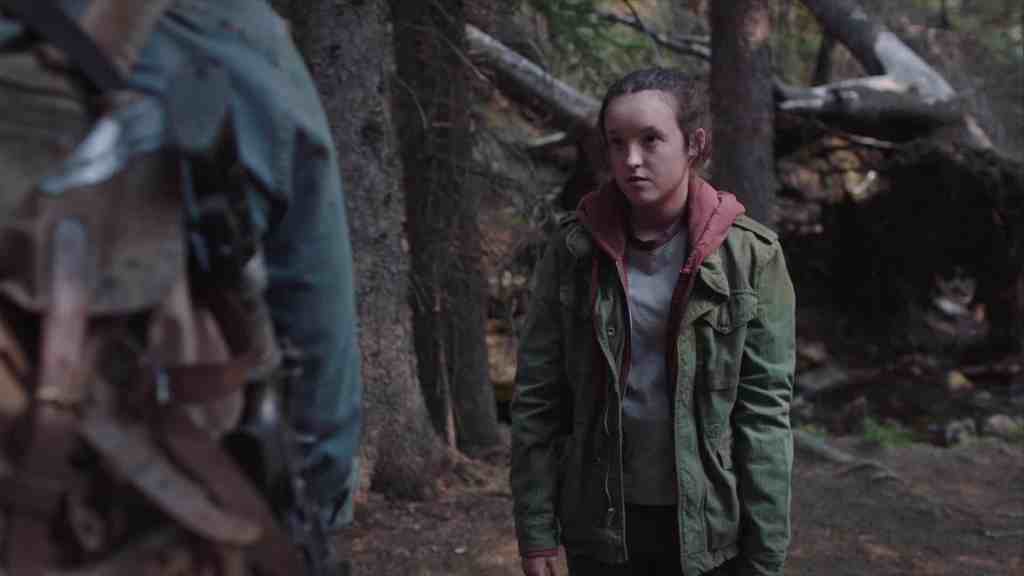
Episode 3 begins with a scene centred on series protagonists Joel (Pedro Pascal) and Ellie (Bella Ramsey), in which the pair are beside a babbling brook where Joel is stacking rocks. Series Showrunner Craig Mazin pointed to this moment, saying it was important to communicate Joel was both missing, and mourning the loss of Tess – a pivotal character within the first two episodes who had become infected towards the end of Episode 2.
This scene was also an opportunity for Joel and Ellie’s relationship to begin taking flight, as Mazin mentioned ‘by necessity, there is no one else to talk to’ and the two needed to come to a ‘detente’.
Series Showrunner and Creative Director on The Last of Us video games Neil Druckmann also described this as a ‘nice evolution’ of the scene shown in the first game where Joel is essentially laying down the rules for Ellie, and noted that in the HBO adaptation Ellie pushes back more by explaining Tess’s death was not her fault.
Druckmann said it was a moment where the two are ‘hiding their vulnerabilities’ as they don’t yet trust each other, adding:
‘I can’t help but look at… Bella and Ellie and say ‘oh you totally feel guilty’. You’re saying these things, but you feel the opposite… it’s coming from an insecure place… ultimately again there’s more to be revealed with that with Ellie’.
Casting Nick Offerman
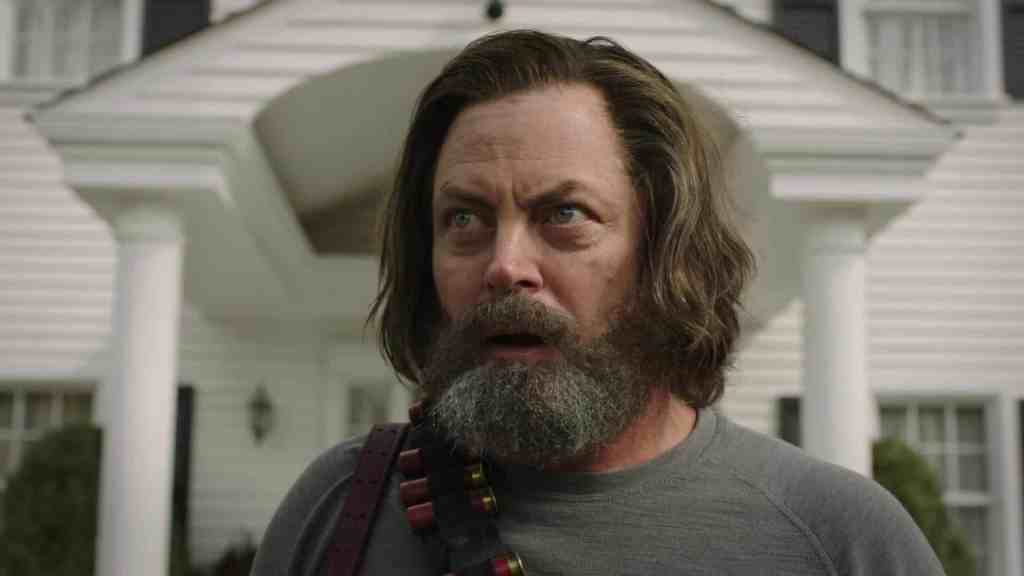
The team also spoke to the casting of Nick Offerman – who plays the role of Bill in the HBO adaptation. Mazin said it was interesting to see Offerman performing in such a dramatic and emotional way, while yet never losing his sense of comedic timing and ability.
Mazin drew some inspiration in hiring a traditionally comedic actor from creator and producer Vince Gilligan (known for his work on Breaking Bad, Better Call Saul, and The X Files), noting:
‘Vince Gilligan said once that he loves hiring comic actors for non comic roles because they have an innate humanity that is there underneath the drama, and they understand the absurdity of the world because that is the bedrock of comedy.’
He’s likely talking about Bryan Cranston, who plays Breaking Bad protagonist Walter White, and Bob Odenkirk, who plays Saul Goodman. Both actors were previously most known for their comedic roles.
Mazin also added that in the scripts he writes, he will tend to include thoughts that a character is thinking in italics, and that these are not usually meant to be formally spoken lines of dialogue. When Offerman first read one of the italicised lines written for Bill – ‘not today you new world order jack boot fucks’, he said:
‘I’m saying that out loud.. a line like that must be announced to the world’.
Choosing ‘Long Long Time’ by Linda Ronstadt
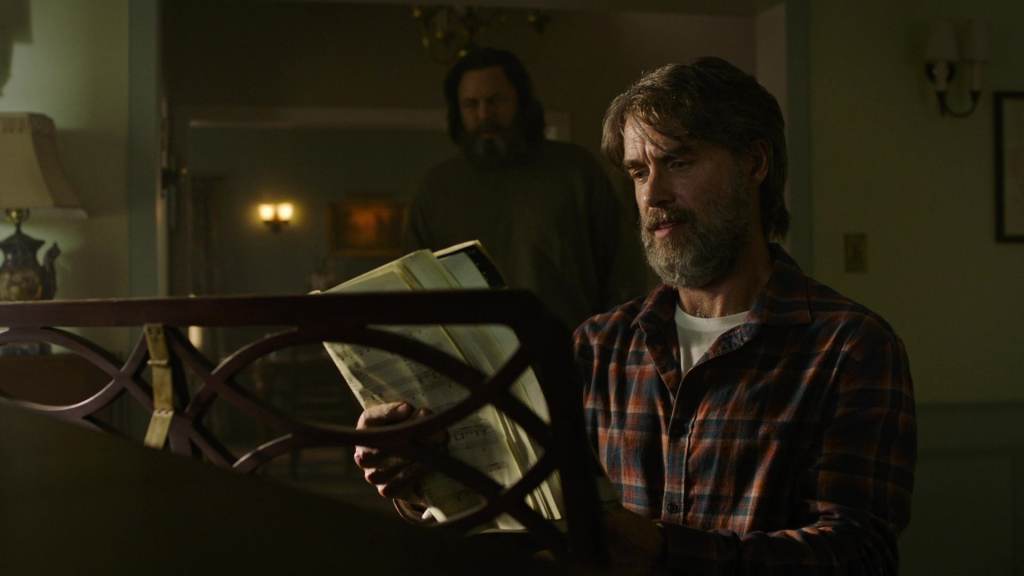
Continuing on with the theme of musical analysis that is littered throughout The Last of Us, comes the scene where Bill and Frank are sat by a piano, playing the song ‘Long, Long Time’ by Linda Ronstadt, which lovingly shares the same name as the title of Episode 3.
Mazin mentioned he wanted the chosen song to describe ‘a state of permanent, lonely, heartache that can never be soothed’, and that the scene should communicate the moment where Frank would both begin to see Bill differently, and ‘want’ him at the same time.
With this in mind, Mazin texted this brief to Seth Rudetsky (host of Seth’s Big Fat Broadway and Seth Speaks on Sirius/XM Satellite Radio’s On Broadway), claiming Rudetsky has an ‘encyclopaedic knowledge’ on music. Mazin said Rudetsky responded to the message ‘within four seconds’ with the song that was then used in the episode.
Mazin also noted he wanted this to be a moment where Frank ultimately ‘sees’ Bill for the first time, and consulted with creative partners on the adaptation who could provide real life input as gay men, Murray Bartlett (Frank in The Last of Us HBO) and Peter Hoar (Director of The Last of Us HBO Episode 3), asking:
‘What is it like if you’re trying to figure out if another person is like you in the minority of sexuality?’
Mazin explained that the men he spoke with ultimately said, ‘there are people you really don’t know about, there are people you’re pretty sure about, and then there are people you’re like oh I see you’, and that it was important Frank could see Bill ‘in a world where he was literally alone’.
Mazin mentioned they were also ‘very motivated’ to cast gay actors and that conversations surrounding general representation and inclusivity were had early on in pre-production. Mazin also revealed that the role of Frank was initially going to be played by Con O’Neill (Viktor Bryukhanov in Chernobyl), but due to booking the role of Izzy Hands in Our Flag Means Death he was unavailable for the part.
It was also explained that the concept of ‘middle aged’ was as much of a factor as sexuality was in the casting process, as the team wanted to tell a story of what ‘older, longer, committed love looks like’, and through that lens they put a casting call out and were then gifted with Murray Bartlett.
Major changes from The Last of Us video game
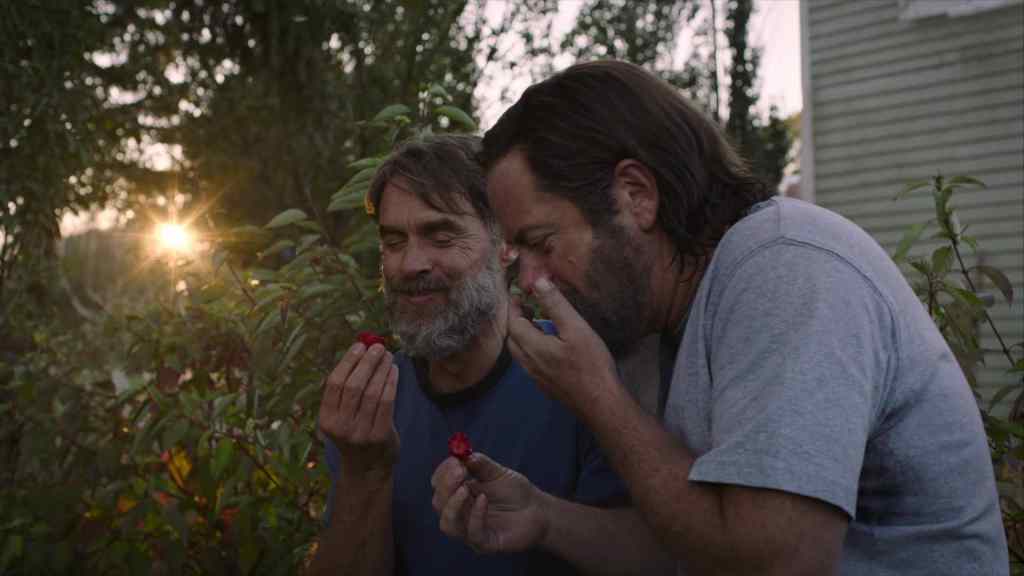
The elephant in the room for those who had played The Last of Us, was that this episode depicted a complete deviation from Bill and Frank’s story as it was originally written.
In the first game, it’s shown through context clues and brief lines of dialogue from Bill that his relationship with Frank ultimately ended with more hostility in the air. It’s revealed that Frank had hung himself, leaving quite a scathing letter to Bill that the player could choose whether or not to give to Bill before acquiring his truck.
In the HBO adaptation, it was decided that this relationship would be approached as a more romantic and heartfelt story, which Druckmann explained invited the characters to grapple with the questions,
‘What is this life for?… We’re here for a limited amount of time, how do we best live it?… Even though you can survive by yourself, what are you surviving for?’
This deviation also brought up conversations surrounding how they could tell a story across two different mediums, as Druckmann explained ‘this story in this episode, you could not tell in the video game’, due to the amount of action oriented gameplay that was implemented in the games. He also felt that the story presented in the game could not be mirrored for television, as audiences would be equally as bored if not playing through those sequences first hand.
Druckmann explained that the ending they ultimately chose for Bill was in the end a much happier one, ‘because he lived a full life’, adding:
‘Here’s what you stand to lose when you love someone, you can feel this immense loss, but here’s what you gain, and the contrast of those two things in this episode I feel really elevate Joel and Ellie’s journey through the telling of like a bottle episode’.
Mazin also added, ‘It was a happy story, they win. In this world that we’ve created for this show, those two guys won.’
Love and end of life
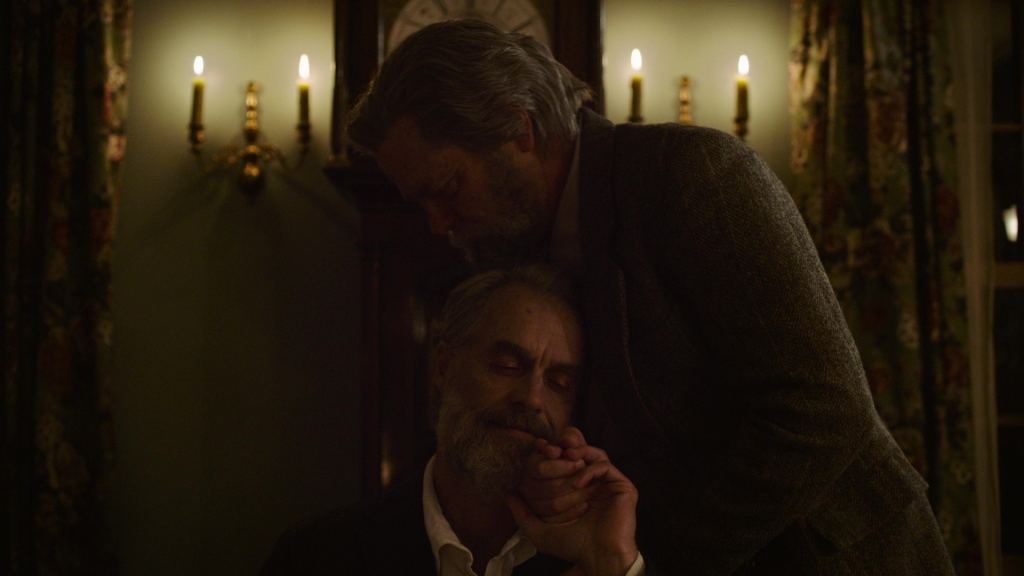
The team also spoke on the themes which surrounded Frank falling ill from a degenerative muscular disorder, with Mazin stating:
‘It happens so commonly, and yet, so rarely as people get older on screen, they tend to be fully healthy until the heart attack staggers them out of nowhere. That does happen, but for a majority of people there is a decline.’
This was seen as an opportunity to emphasise the caretaker roles they had played for each other through their lives, and it’s mentioned during this episode of the podcast that there is a ‘dichotomy’ between the pair. Frank shows his love outwardly by creating a home for them, growing strawberries and inviting Joel and Tess into the town for lunch, whereas Bill wants to protect Frank by keeping them as guarded as possible, and Mazin mentions that ‘both of those loves are required.’
Mazin also pointed to a line Bill says after spending the day with Frank in their final hours: ‘This isn’t the tragic suicide at the end of the play. I’m old, I’m satisfied, and you were my purpose.’
Mazin mentions this was ‘lifted almost directly’ from The Boys in the Band – a 1968 play which centres on gay men navigating their lives and their relationships, written by playwright Mart Crowley.
In the play, one of the men says to another, ‘this isn’t the tragic suicide at the end of the play, not all gay men have to die at the end of the play.’ Mazin mentioned that there is a ‘tradition of equating homosexuality with tragedy,’ and that ‘a gay man couldn’t just possibly age and be happy and live long,’ so it was important for Bill to explicitly say that his love story with Frank would be different.
The final window shot
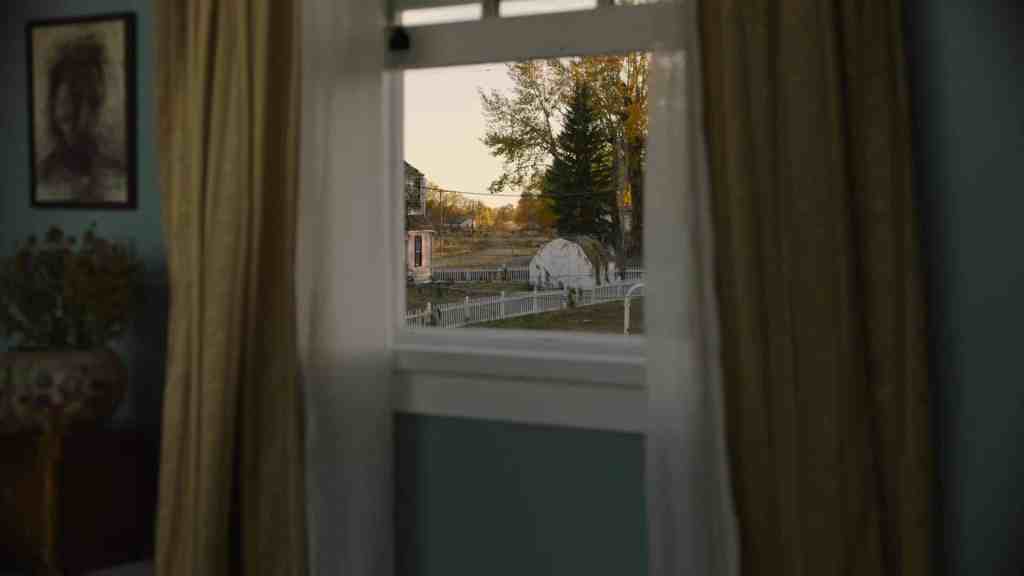
This episode also showcased a couple of the iconic items depicted in the first game, including Ellie’s sunset t-shirt, Bill’s truck, and the open window showcased in the title screen of The Last of Us.
Druckmann and Mazin mentioned that including the window was an intentional choice, and that they initially had an idea to open every episode in the series with a window reflecting a different circumstance in that episode. They also had the thought to replace the ‘skip intro’ button, shown across multiple streaming services, with the words ‘press play’, so the audience could sit and look at the window for as long as they wanted.
Though they had filmed multiple window shots, it was mentioned this idea didn’t make the most sense for the series. Druckmann explained the positives of this laying on the cutting room floor meant they ultimately landed on an ending they loved, which gave fans of the games ‘the sense of both promise and loss’ the window implied.
Mazin added, ‘It brings us a sense of happiness. That you just know that Bill and Frank are at peace, and that finally Bill found the person he could love for a long, long time’.
And this is where I began to promptly sob.
Additional analysis and notable quotes
- After watching Episode 3, Troy Baker texted Neil Druckmann two emojis conveying how the episode left him – a strawberry and a crying face 🍓😭
- Craig Mazin – ‘Vince Gilligan said once that he loves hiring comic actors for non comic roles because they have an innate humanity that is there underneath the drama, and they understand the absurdity of the world because that is the bedrock of comedy’.
- Neil Druckmann – (Referencing Bill and Frank’s relationship) ‘Here’s what you stand to lose when you love someone, you can feel this immense loss, but here’s what you gain. And the contrast of those two things in this episode, I feel really elevate Joel and Ellie’s journey through the telling of like a bottle episode’.
- Craig Mazin – ‘It was a happy story, they win. In this world that we’ve created for this show, those two guys won.’
- Craig Mazin – ‘It brings us a sense of happiness. That you just know that Bill and Frank are at peace, and that finally Bill found the person he could love for a long, long time’
For further analysis and reading on the HBO adaptation of The Last of Us, you can check out the following articles:
- A spoiler-free review of the entire first season of The Last of Us HBO TV series
- The Last of Us HBO TV series: Cast and Character Guide
- The Last of Us interview: Henry and Perry actors examine their work
- The Last of Us interview – Storm Reid on portraying Riley
Episode recaps and analysis:
- The Last of Us – Episode 1 Recap – ‘When You’re Lost in the Darkness’
- The Last of Us – Episode 2 Recap – ‘Infected’
- The Last of Us – Episode 3 Recap – ‘Long, Long Time’
- The Last of Us – Episode 4 Recap – ‘Please Hold to My Hand’
- The Last of Us – Episode 5 Recap – ‘Endure and Survive’
- The Last of Us – Episode 6 Recap – ‘Kin’
- The Last of Us – Episode 7 Recap – ‘Left Behind’
- The Last of Us – Episode 8 Recap – ‘When We Are in Need’
- The Last of Us – Episode 9 Finale Recap – ‘Look for the Light’
Behind-the-scenes podcast recaps:
- The Last of Us Podcast – Behind the Scenes of Episode 1 – ‘When You’re Lost in the Darkness’
- The Last of Us Podcast – Behind the Scenes of Episode 2 – ‘Infected’
- The Last of Us Podcast – Behind the Scenes of Episode 3 – ‘Long, Long Time’
- The Last of Us Podcast – Behind the Scenes of Episode 4 – ‘Please Hold to My Hand’
- The Last of Us Podcast – Behind the Scenes of Episode 5 – ‘Endure and Survive’
- The Last of Us Podcast – Behind the Scenes of Episode 6 – ‘Kin’
- The Last of Us Podcast – Behind the Scenes of Episode 7 – ‘Left Behind’
- The Last of Us Podcast – Behind the Scenes of Episode 8 – ‘When We Are In Need’
- The Last of Us Podcast – Behind the Scenes of Episode 9 – ‘Look for the Light’
The Last of Us is now streaming on HBO Max in the US, and Binge in Australia.
